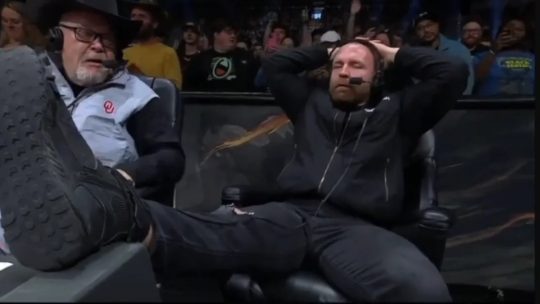As noted before, Major League Wrestling filed an antitrust lawsuit last year against WWE claiming that WWE illegally interfered in several of their business deals with television networks and engaged in contract tampering with several of their contracted talent. WWE recently filed a motion seeking a protective order to halt the lawsuit and block MLW’s requests for company documents for their discovery process.
PWInsider’s Mike Johnson reported that U.S. District Court, California Northern District Judge Edwards J. Davila ruled earlier today in favor of WWE and officially dismissed MLW’s anti-trust lawsuit based on recent court records.
In his nine-page filing, Judge Davila stated that MLW did not present enough evidence to prove their claim of WWE violating Section 2 of the Sherman Antitrust Act and other alleged illegal actions. Davila also stated that due to this issue, the remainder of MLW’s lawsuit and their discovery requests were no longer valid concerns in the view of the court and those arguments were done as well.
Despite the lawsuit’s dismissal, Judge Davila granted MLW the ability to file a new amended lawsuit within the next twenty-one days to attempt to resurrect their legal claims against WWE or else their legal case will be officially closed.
Following the ruling, PWInsider contacted MLW owner Court Bauer for an official statement, who stated:
“Our legal team is already at work on amending the complaint. We have every intention to continue pursuing our case against WWE.”
-Court Bauer, Founder of Major League Wrestling
Official ruling:
“WWE does not dispute the geographic market of the United States. WWE does, however, argue that MLW has not plausibly alleged facts supporting its proposed product market, particularly due to the lack of allegations about the structure of the television and streaming industries, the production of professional wrestling programming, and the unavailability of reasonably interchangeable alternatives to professional wrestling content.
In response, MLW asserts that it is not required to include express allegations regarding the cross-elasticity of demand or the absence of reasonably interchangeable products, that products with potentially interchangeable substitutes can nonetheless constitute a relevant antitrust submarket, and that WWE’s arguments “at most raise factual issues that cannot be decided on a motion to dismiss.”
MLW’s argument that it need not “allege cross-elasticity of demand and the absence of ‘reasonably interchangeable alternatives’ to professional wrestling programming” is unavailing.
The Court finds that MLW has not included sufficient facts to plausibly allege a relevant antitrust product market. Regarding the proposed market, the complaint alleges only that there are four competitors in the “United States professional wrestling market”; that the “business of promoting professional wrestling as sports entertainment is fundamentally a media industry, with revenues and business valuation[s] driven largely by fees obtained from broadcasting rights deals”; and that corporations such as NBCUniversal and Fox Sports “purchase broadcasting rights in the [proposed market] for their various distribution channels such as broadcast networks, cable and satellite services, streaming networks, and film production companies.”
These facts, as pled, are not sufficient to provide an understanding of the characteristics of the relevant market, including the existence or lack of substitutes.
For example, there are no allegations addressing why other “sports entertainment” or “media” content for which broadcasting rights might be sold to distribution channels are not appropriate substitutes. MLW is correct that a single sport may constitute a relevant market, but there are no facts alleged in the complaint to support that legal conclusion. Additionally, the complaint uses multiple formulations to describe the proposed market, which further complicates the question of the market’s boundaries and the reasonably interchangeable products contained within.
MLW argues that the existence of reasonably interchangeable substitutes is a factual issue inappropriate for resolution on a motion to dismiss, relying on Reveal Chat Holdco, LLC v. Facebook, Inc., 471 F. Supp. 3d 981 (N.D. Cal. 2020). That reliance is misplaced. In Reveal Chat Holdco, the court expressly noted that “Plaintiffs need to clearly define the boundaries of the market.” The court rejected defendant’s argument that the proposed data market did not “encompass all economic substitutes” as requiring a “more developed factual record” because plaintiffs’ allegations supported their arguments that specific characteristics distinguished the data products at issue from other types of data.
For the reasons above, the Court finds that MLW’s allegations are insufficient to plausibly allege a relevant product market. Accordingly, the Court GRANTS WWE’s motion to dismiss MLW’s Sherman Act claim.
Although the Court dismisses the Sherman Act claim based on the insufficiency of the relevant market allegations, it notes briefly that MLW’s allegations regarding monopoly power and antitrust injury, as currently pled, are unlikely to withstand a motion to dismiss for many of the reasons outlined in WWE’s Motion.
With respect to monopoly power, the Court finds particularly concerning the bare allegation that WWE “holds approximately 85% of the market,” because “Plaintiff does not even allege what it is measuring.” In the paragraphs immediately prior to the marketshare allegation, MLW alleges facts regarding WWE’s annual revenue, the “combined average annual value of WWE’s U.S. TV rights” for certain programs, U.S. television viewership numbers for certain WWE programs, and average television viewership ratings.
Although the Court might, in some circumstances, “reasonably infer how Plaintiff arrived at its calculations—e.g., by proportion of total revenue . . . Plaintiff’s allegations make it even less clear what [it] might be measuring.” FTC v. Facebook, Inc., 560 F. Supp. 3d at 18. And the Court is troubled by MLW’s argument that it alleged direct evidence of monopoly power, including that “WWE has also increased prices.” Opp’n 11 (citing Compl. ¶¶ 10, 25, 52, 71–73).
From the Court’s review of the complaint, including the cited paragraphs, MLW alleges only that WWE has “ke[pt] prices high,” “has the ability to raise prices,” prevented “access to [content] at lower prices,” and “eliminat[ed] price competition.”
If MLW wishes to argue that WWE has “increased” prices, it should so allege. MLW’s allegations regarding antitrust injury appear similarly lacking, as the harms it has alleged—e.g., loss of contract revenues due to WWE’s interference—are specific to MLW, rather than to competition at large.
MLW includes a single allegation that consumers would have increased access to higher quality professional wrestling entertainment content at lower prices but for WWE’s conduct, but it appends no additional facts to support this conclusion.
It is not clear to the Court why WWE’s market power metrics were only compared to AEW’s, as opposed to overall numbers for the proposed market. Similarly, the significance of the comparison of the metrics for two or three WWE programs to one AEW program is not apparent to the Court. The latter metrics appear to compare apples to oranges, and both sets of metrics appear only to indicate the relative success of WWE and AEW, rather than WWE’s position in the overall proposed market.
MLW states that it “is a fundamental principle of supply and demand that decreased output leads to increased price.” This “fundamental principle” requires assumptions, such as constant demand, that MLW has not supported with allegations.
State Law Claims
Because the Court dismisses the Sherman Act claim, it lacks subject matter jurisdiction over MLW’s remaining claims under California law for intentional interference with contractual relations, intentional interference with prospective economic relations, and violation of the UCL.
MLW’s state law claims are therefore DISMISSED.
Leave to Amend
The Court finds that additional allegations may cure the deficiencies outlined above and in WWE’s Motion.
Accordingly, the Court GRANTS MLW leave to amend. Any amendment must be filed within 21 days of the issuance of this order.
Other Motions
Because the Court here resolves WWE’s Motion to Dismiss, it DENIES as moot WWE’s Motion for Protective Order staying discovery during the pendency of the Motion to Dismiss.
Likewise, because MLW’s complaint is dismissed, the Court DENIES as moot WWE’s Administrative Motion for Status Conference Regarding Discovery Schedule.
CONCLUSION
For the foregoing reasons, WWE’s Motion to Dismiss is GRANTED with LEAVE TO AMEND. WWE’s Motion for Protective Order and Administrative Motion for Status Conference Regarding Discovery Schedule are DENIED as moot.
Discovery in this action is STAYED until further Court order.”

 TNA Impact! Results – July 25, 2024 – “Broken” Matt Hardy & ABC vs. The System & JDC
TNA Impact! Results – July 25, 2024 – “Broken” Matt Hardy & ABC vs. The System & JDC Four New Matches Announced for ROH Death Before Dishonor 2024
Four New Matches Announced for ROH Death Before Dishonor 2024 Britt Baker vs. Mercedes Mone for TBS Title Announced for AEW All In 2024
Britt Baker vs. Mercedes Mone for TBS Title Announced for AEW All In 2024




